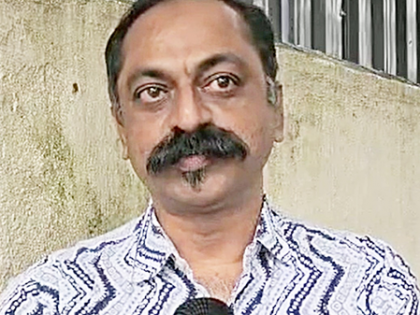‘Justice delayed, not denied’: 2006 Mumbai blast victims speak out after SC pauses acquittal of accused
By IANS | Updated: July 24, 2025 16:34 IST2025-07-24T16:27:43+5:302025-07-24T16:34:31+5:30
Mumbai, July 24 Victims of the 2006 Mumbai train bomb blasts on Thursday welcomed the Supreme Court's decision ...

‘Justice delayed, not denied’: 2006 Mumbai blast victims speak out after SC pauses acquittal of accused
Mumbai, July 24 Victims of the 2006 Mumbai train bomb blasts on Thursday welcomed the Supreme Court's decision to stay the Bombay High Court's recent verdict acquitting all 12 accused in the case.
Many victims expressed frustration with the delays in the justice system, urging the central government to reform the judiciary so that justice is swift, transparent, and effective.
The Supreme Court's intervention came as a much-needed ray of hope for survivors who have waited nearly two decades for closure.
Radhe Shyam Dubey, one of the victims of the 2006 blasts, called the Supreme Court’s decision a step in the right direction.
"The decision taken by the Maharashtra government to escalate the case to the Supreme Court is a very good one. I want to thank the Supreme Court as well for staying the High Court's order acquitting all 12 accused in the Mumbai train blasts case," he said.
Dubey criticised the judicial delays, stating that the High Court took 19 years to address a case where the trial court had already declared the accused guilty.
“Why was there such a long delay? The High Court should have acted much earlier. And on what basis did they pass a judgment of acquittal after all these years?” he asked.
He went on to express deep concern about the state of India’s legal system.
“I see collusion in this. The way this case has been handled is a mockery of the judiciary. It threatens the entire law and order structure of the country. The central government must take immediate steps to reform the judiciary. Verdicts must come quickly - only then will criminals be deterred from committing such crimes.”
Highlighting the tragic fate of innocent citizens, he added, “What fault did those people have who died in the train blasts? Were they killed just because they were travelling by train? Criminals are being freed while the innocent suffer - what kind of justice is this? India is reaching shameful lows at the international level because of such flawed systems.”
Dubey urged the government to take accountability and implement reforms without further delay.
“If reforms are not brought soon, we will keep wasting precious time and innocent lives will continue to be lost. A change in the system is the need of the hour.”
On the Supreme Court’s role, he said: “I have a lot of faith in the Supreme Court. Every citizen in India respects the authority. I only hope that its decisions are transparent and based on truth. If someone is innocent, let them be acquitted. But if someone is guilty, they must receive the harshest possible punishment. Only then will India have a strong and credible legal system. Change is the law of nature, and change is what our judiciary now urgently needs.”
Mahendra Pitale, another victim of the 2006 blasts, lost his hand in the tragedy. Speaking to IANS, he described the High Court’s acquittal of the accused as more painful than the blast itself.
"I lost one of my hands in the explosion on July 11, 2006. But what shook me more was the High Court’s decision to acquit all 12 accused. That news gave me a bigger shock than the actual incident. I kept wondering - why are the real culprits still roaming free?” he said.
Pitale emphasised the importance of accountability and feared that the accused might now be living freely among the public. “Those who carried out the blast could be walking around in Mumbai or elsewhere today. Nineteen years later, if these men are set free, then who will actually find the real culprits?”
He found a ray of hope in the Supreme Court’s stay order.
“For me, the Supreme Court’s intervention brought some mental peace. I believe a proper investigation might now resume and lead to the real culprits. Even if some of the accused are not guilty, those who truly are must be punished as soon as possible.”
Recounting the horror of the day, he said: “When the blast happened on July 11, 2006, I had taken my usual train after work. As soon as I boarded, there was a loud explosion. I didn’t know what had happened. A man helped me get to the hospital, and only then did I realise that the blast had damaged my entire hand. Around me, it was complete devastation. There were bodies everywhere. People had lost their hands, legs. There was blood on everyone's clothes. The scene was indescribable.”
Pitale concluded with an appeal to the country’s leadership: “I request the President and the Prime Minister of India to ensure that such incidents never happen again. Those involved in such killings must be punished swiftly and severely. Only then can we prevent others from thinking they can do the same and walk free.”
On July 11, 2006, a series of coordinated bomb blasts ripped through Mumbai’s suburban railway network during the evening rush hour. The attacks killed over 180 people and injured hundreds more, making it one of the deadliest terror strikes in India.
The case saw numerous twists and delays over the years. In 2015, a special Maharashtra Control of Organised Crime Act (MCOCA) court convicted 12 individuals in connection with the blasts. However, in 2024, the Bombay High Court overturned those convictions, citing a lack of evidence and procedural lapses. This decision was widely criticised by victims, survivors, and civil society groups.
--IANS
jk/dan
Disclaimer: This post has been auto-published from an agency feed without any modifications to the text and has not been reviewed by an editor
Open in app